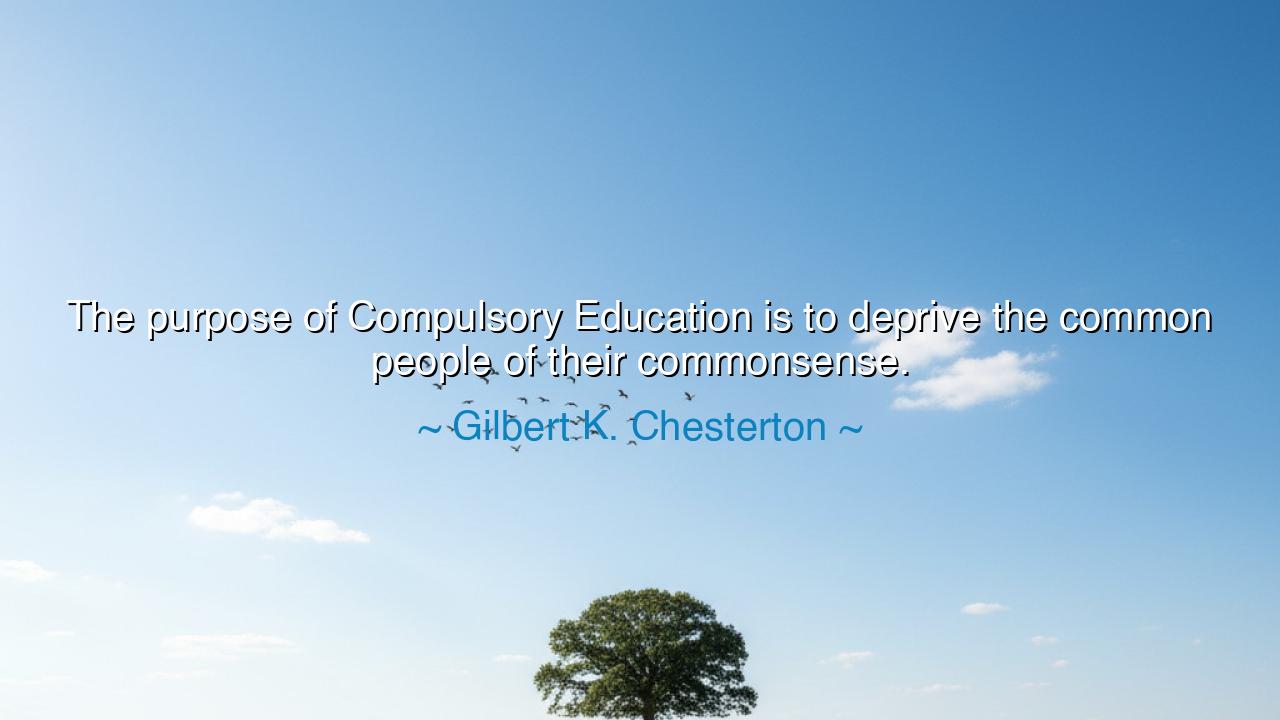
The purpose of Compulsory Education is to deprive the common
The purpose of Compulsory Education is to deprive the common people of their commonsense.






The words of Gilbert K. Chesterton, “The purpose of Compulsory Education is to deprive the common people of their commonsense,” strike like thunder upon the quiet hills of conformity. They are not a rejection of learning, but a lament for what modern education has become — a machine that often teaches men to forget how to think for themselves. Chesterton, that great defender of paradox and wit, saw with piercing clarity that education, once meant to liberate the mind, had begun to imprison it. His words are both a warning and a mirror, reflecting a truth that echoes across centuries: when education becomes a tool of control rather than enlightenment, it strips the soul of its most sacred inheritance — commonsense, the natural wisdom of life itself.
To understand his meaning, one must return to the age in which he spoke. In Chesterton’s time, the early 20th century, great nations were industrializing not only their economies but their minds. Schools were becoming factories of thought, where children were molded to fit the machinery of modern society. They were taught facts, but not understanding; procedures, but not purpose. To Chesterton, this compulsory education was no longer the nurturing of individuality but the conditioning of obedience. The common man, who once learned from experience, from faith, from the soil and the hearth, was being told that his natural instincts were crude, his inherited wisdom outdated. Thus, the very thing that made him human — his intuitive grasp of truth — was being trained out of him.
Consider the farmer of old, who knew the rhythm of the seasons, the dignity of labor, and the balance between man and nature. He did not need a degree to know that greed destroys harmony, or that family sustains life. Yet as society modernized, such men were deemed uneducated, their wisdom dismissed as superstition. Meanwhile, the educated elite, armed with theory but divorced from reality, made choices that led to war, pollution, and the alienation of spirit. Chesterton saw this irony: that education without wisdom creates clever fools, and that the more a man learns to obey institutions, the less he trusts his own judgment.
History is filled with the consequences of this tragedy. In totalitarian regimes, education was used not to awaken thought but to extinguish it. The youth were taught loyalty instead of truth, compliance instead of curiosity. When Nazi Germany indoctrinated its children, when Soviet Russia silenced its poets, when modern bureaucracies demand uniformity of mind — each followed the same principle that Chesterton condemned. They turned education into manipulation, and in doing so, murdered commonsense — that deep, inner compass which tells a person when something is simply wrong, no matter how many officials declare it right.
Yet Chesterton’s quote should not make us despise education, but rather call us to redeem it. True education is not the memorization of facts but the awakening of judgment. It teaches not what to think, but how to think. The ancients knew this well. Socrates never lectured; he questioned. Confucius did not dictate; he invited reflection. These sages understood that wisdom grows not in classrooms alone, but in the conversation between experience and reason. Commonsense, then, is the harmony between the heart and the intellect — the art of seeing truth without distortion, of acting rightly without the paralysis of theory.
In our age of information, Chesterton’s warning rings even louder. We have built schools that overflow with data but starve for discernment. We produce experts who can split atoms but cannot mend families, engineers who can build towers but not community. The modern student drowns in knowledge yet thirsts for meaning. Commonsense, the quiet wisdom of living truthfully, has become almost revolutionary. To restore it, one must reclaim the ancient virtues: humility, observation, curiosity, and the courage to say, “This may be what I am told, but does it make sense?”
Let this, then, be the lesson for all who seek truth: learn deeply, but never surrender your judgment. Question even the teachers. Test even the doctrines. Education is the tool, not the master. Remember that wisdom lives not only in books but in the lives of people — in mothers who teach compassion, in elders who teach patience, in craftsmen who teach care. A nation that honors such knowledge can never be enslaved.
For in the end, commonsense is not the enemy of education, but its soul. When knowledge and humility walk hand in hand, when schools teach the art of living and not just the craft of working, then education becomes what it was meant to be — not the cage of the mind, but the wings of the spirit.






AAdministratorAdministrator
Welcome, honored guests. Please leave a comment, we will respond soon